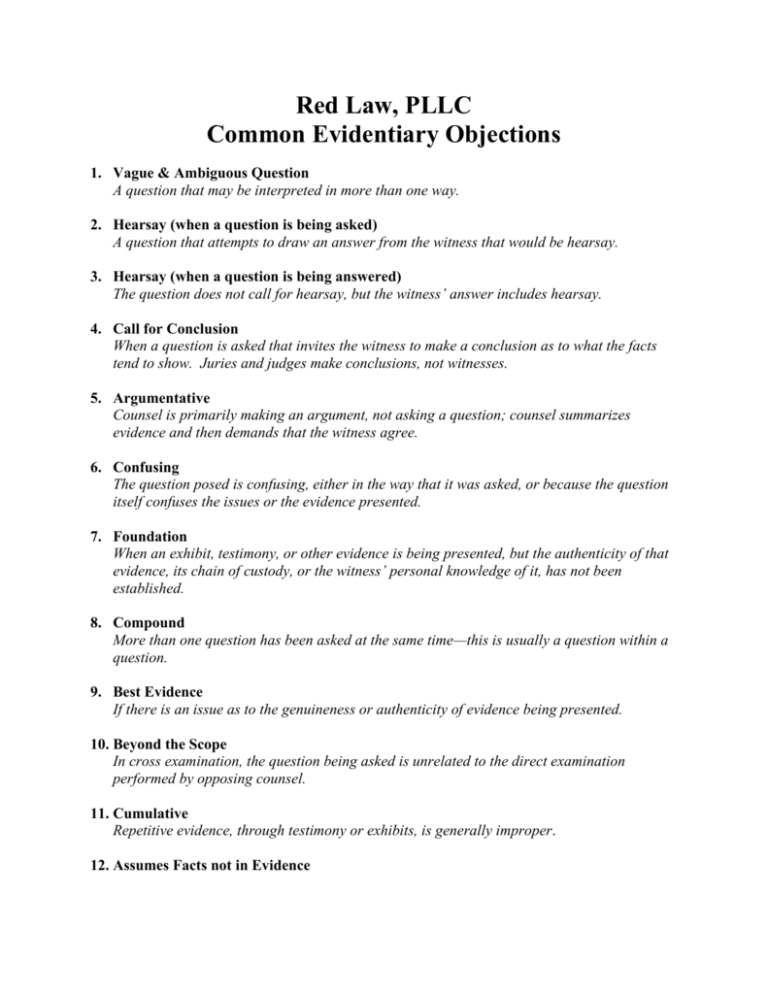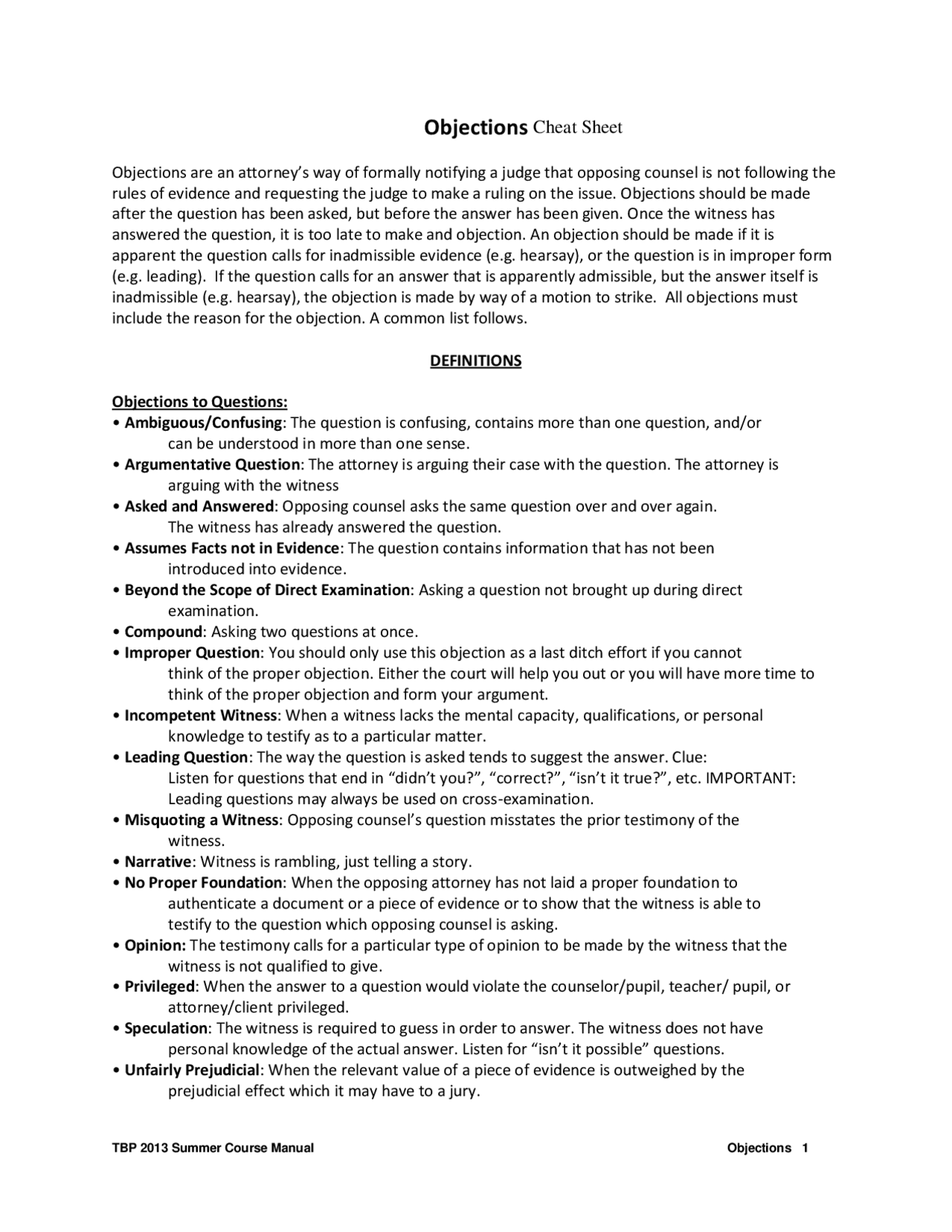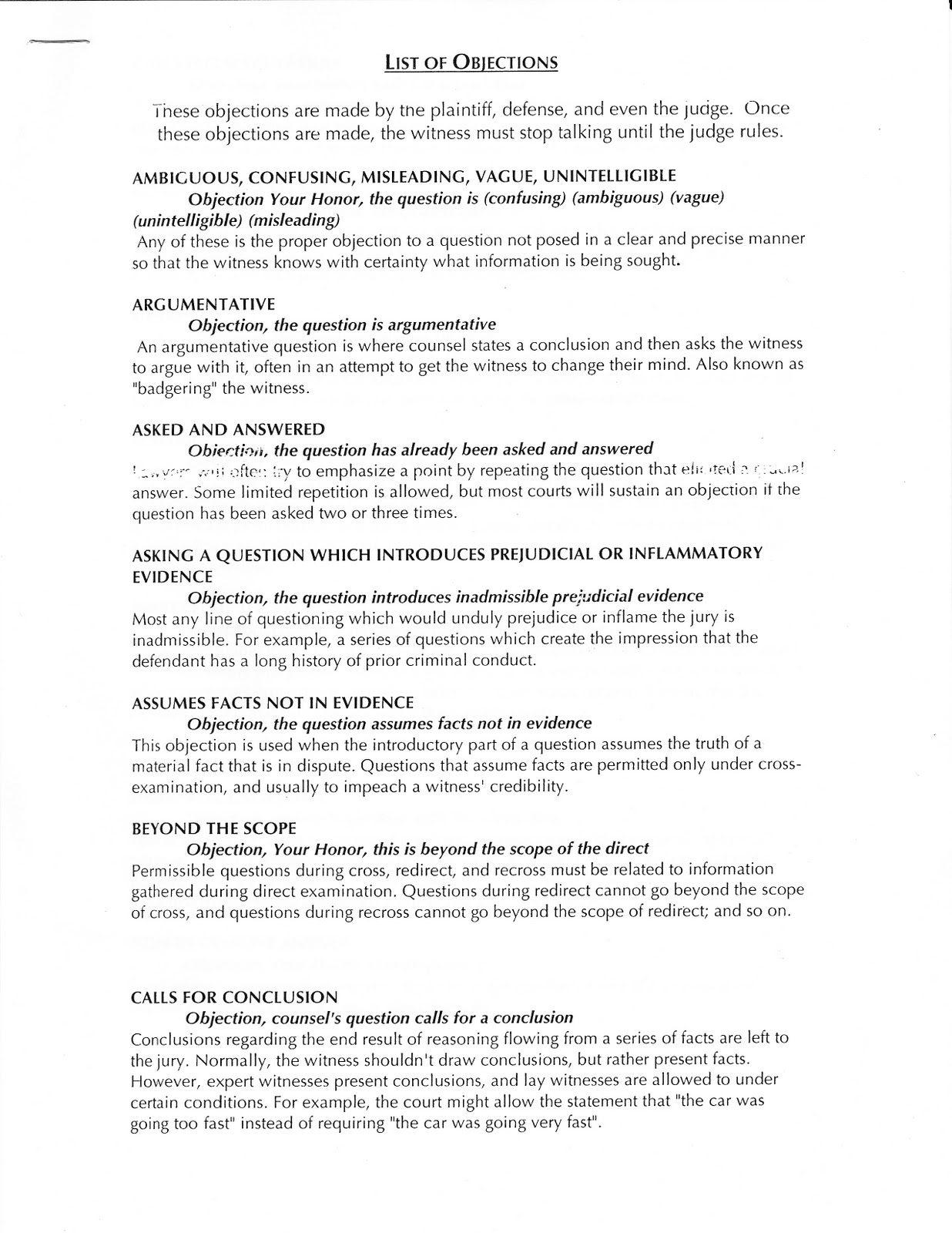Common Trial Objections Cheat Sheet - This section will better explain the purpose behind the objection. A ssuming facts not in evidence: What are the most common objections in court? Questions may be objectionable because they violate one of the “big four” evidentiary principles (relevance, authentication, hearsay, privilege) or. Contains as a predicate a statement. With this cheat sheet, you can quickly object to an. This table sets out the most common objections, as well as exceptions to those objections. What are the two ways a judge can rule on an objection? This checklist sets out the grounds and rationale for the most common objections, as well as responses and exceptions to those objections. Repeats the same question 7.
What are the most common objections in court? With this cheat sheet, you can quickly object to an. This table sets out the most common objections, as well as exceptions to those objections. This section will be an example of how you can make your objection to the court. A ssuming facts not in evidence: This checklist sets out the grounds and rationale for the most common objections, as well as responses and exceptions to those objections. Questions may be objectionable because they violate one of the “big four” evidentiary principles (relevance, authentication, hearsay, privilege) or. This section will better explain the purpose behind the objection. What are the two ways a judge can rule on an objection? Repeats the same question 7.
Repeats the same question 7. With this cheat sheet, you can quickly object to an. This section will better explain the purpose behind the objection. This table sets out the most common objections, as well as exceptions to those objections. A ssuming facts not in evidence: Contains as a predicate a statement. What are the most common objections in court? Questions may be objectionable because they violate one of the “big four” evidentiary principles (relevance, authentication, hearsay, privilege) or. This section will be an example of how you can make your objection to the court. What are the two ways a judge can rule on an objection?
a list of common objections to evidence
With this cheat sheet, you can quickly object to an. Questions may be objectionable because they violate one of the “big four” evidentiary principles (relevance, authentication, hearsay, privilege) or. This table sets out the most common objections, as well as exceptions to those objections. Contains as a predicate a statement. What are the two ways a judge can rule on.
Objections Cheat Sheet A Comprehensive Guide to Common Objections and
This table sets out the most common objections, as well as exceptions to those objections. This checklist sets out the grounds and rationale for the most common objections, as well as responses and exceptions to those objections. This section will be an example of how you can make your objection to the court. This section will better explain the purpose.
Court Objections Cheat Sheet Printable Templates Free
What are the most common objections in court? With this cheat sheet, you can quickly object to an. Contains as a predicate a statement. This section will be an example of how you can make your objection to the court. This checklist sets out the grounds and rationale for the most common objections, as well as responses and exceptions to.
Objections Cheat Sheet PDF
What are the two ways a judge can rule on an objection? What are the most common objections in court? A ssuming facts not in evidence: Contains as a predicate a statement. Questions may be objectionable because they violate one of the “big four” evidentiary principles (relevance, authentication, hearsay, privilege) or.
Common Trial Objections Hearsay Witness
What are the most common objections in court? This section will better explain the purpose behind the objection. A ssuming facts not in evidence: With this cheat sheet, you can quickly object to an. This section will be an example of how you can make your objection to the court.
Common Trial Objections Evidence (Law) Witness
What are the two ways a judge can rule on an objection? This section will better explain the purpose behind the objection. This section will be an example of how you can make your objection to the court. This checklist sets out the grounds and rationale for the most common objections, as well as responses and exceptions to those objections..
2013 Objections Trial Techniques Deposition (Law) Cross Examination
What are the two ways a judge can rule on an objection? Contains as a predicate a statement. A ssuming facts not in evidence: This table sets out the most common objections, as well as exceptions to those objections. Questions may be objectionable because they violate one of the “big four” evidentiary principles (relevance, authentication, hearsay, privilege) or.
Common Objections In Court Cheat Sheet prntbl.concejomunicipaldechinu
With this cheat sheet, you can quickly object to an. A ssuming facts not in evidence: This checklist sets out the grounds and rationale for the most common objections, as well as responses and exceptions to those objections. What are the two ways a judge can rule on an objection? This table sets out the most common objections, as well.
Common Objections In Court Cheat Sheet prntbl.concejomunicipaldechinu
This table sets out the most common objections, as well as exceptions to those objections. What are the two ways a judge can rule on an objection? Contains as a predicate a statement. What are the most common objections in court? Questions may be objectionable because they violate one of the “big four” evidentiary principles (relevance, authentication, hearsay, privilege) or.
A Comprehensive Guide to Common Objections, Privileges, Motions and
What are the most common objections in court? A ssuming facts not in evidence: This table sets out the most common objections, as well as exceptions to those objections. Questions may be objectionable because they violate one of the “big four” evidentiary principles (relevance, authentication, hearsay, privilege) or. This section will be an example of how you can make your.
This Section Will Be An Example Of How You Can Make Your Objection To The Court.
A ssuming facts not in evidence: Questions may be objectionable because they violate one of the “big four” evidentiary principles (relevance, authentication, hearsay, privilege) or. This checklist sets out the grounds and rationale for the most common objections, as well as responses and exceptions to those objections. This section will better explain the purpose behind the objection.
Contains As A Predicate A Statement.
This table sets out the most common objections, as well as exceptions to those objections. What are the most common objections in court? What are the two ways a judge can rule on an objection? With this cheat sheet, you can quickly object to an.









